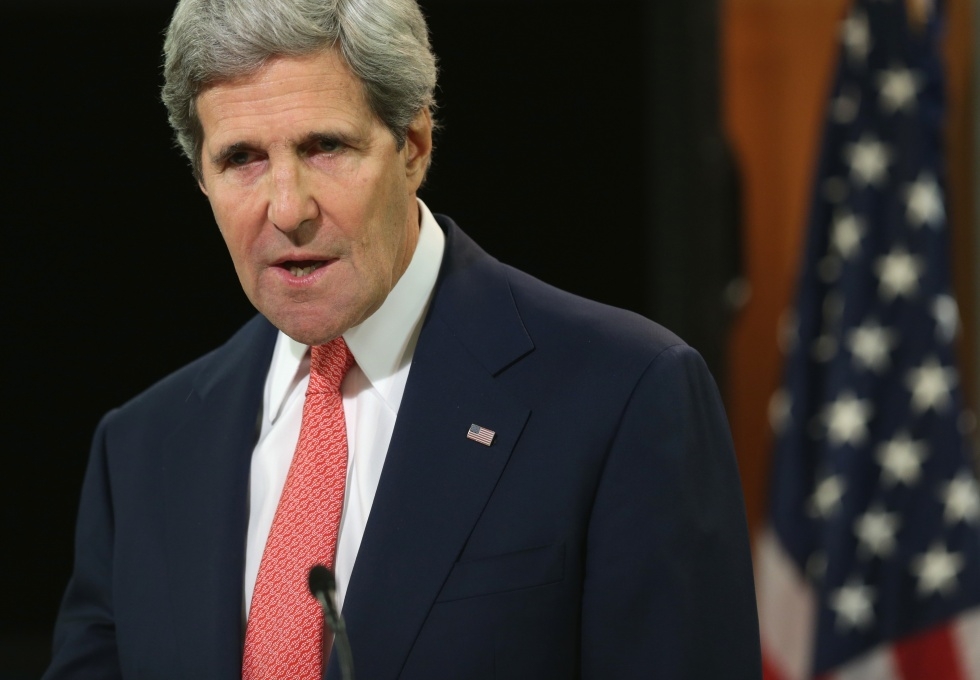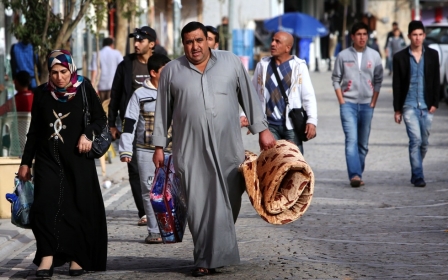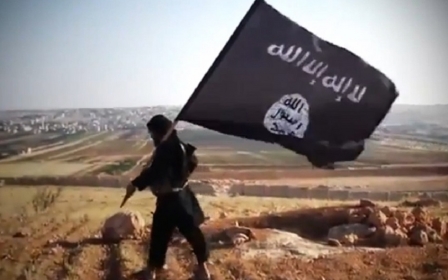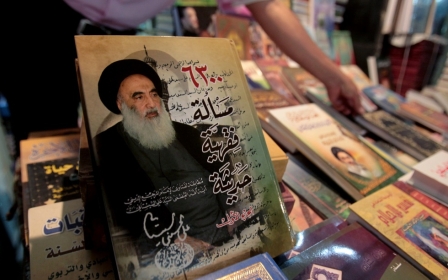Kerry in talks with Iraq's Maliki as militants seize border crossings

US Secretary of State John Kerry entered into talks with Iraqi Prime Minister Nuri al-Maliki on Monday in Baghdad. He had arrived in the country earlier in the day on a surprise trip to push for Iraqi unity and stability, as Sunni militants advanced in west Iraq after security forces retreated.
Flying in from Jordan on a visit which the State Department had sought to keep secret amid security concerns, Kerry was to meet with the beleaguered Maliki and Iraqi leaders across the political and communal spectrum.
Kerry "will discuss US actions underway to assist Iraq as it confronts this threat from ISIL and urge Iraqi leaders to move forward as quickly as possible with its government formation process to forge a government," State Department spokeswoman Jen Psaki said.
Iraqi security forces are struggling to hold their ground in the face of an insurgent onslaught that has seized major areas of five provinces, displaced hundreds of thousands of people and sparked fears that the country could be torn apart.
On Sunday, armed Sunni groups seized control of three border crossings with Syria and Jordan, prompting Jordanian authorities to beef up security on their side of the border amid fears of incursions by militants from the Islamic State of Iraq and the Levant (ISIL).
Iraqi officials said on Sunday militants had taken over the crossing with Jordan at Turaibil and were now controlling the border with Syria at al-Waleed after government forces had pulled out. It comes a day after the restive town of al-Qaim, another town on the Syrian border, fell to armed groups including ISIL.
The latest ISIL-led offensive has seen a number of strategic areas fall out of government hands in recent days, with three other towns in Anbar province having been taken over by armed Sunni militants. Rawah, Anah and Rutba, which sits on the highway linking Baghdad and Amman, have been taken since Friday, which prompted one tribal leader to tell the BBC that 90 percent of Anbar is now in hands of Sunni militants.
US President Barack Obama has warned the recent ISIL surge could spread region-wide conflict.
“We’re going to have to be vigilant generally,” he told US television network CBS on Sunday. “Right now the problem with ISIS is the fact that they’re destabilising the country.”
“That could spill over into some of our allies like Jordan,” he added.
After the Turaibil crossing was seized on Sunday Jordanian officials moved swiftly to effectively close the border with Iraq.
“The last traffic was around 7.30pm (1630 GMT) and border officials are saying the situation is not normal on the other side of the border,” Minister of State for Media and Communication Mohammad al-Momani told the Reuters news agency.
The crossing sits 357 miles from the Iraqi capital Baghdad and just 199 miles from Jordan’s Amman, with its strategically vital location prompting Jordanian soldiers to be moved nearby. A military source confirmed to Reuters that army units had been put on a state of alert on the border with Iraq and said soldiers had been redeployed to stem “any potential or perceived security threats”.
Other Jordanian military sources said, however, tightened security is a pre-emptive measure that is not indicative of any imminent threat against the country.
“Our borders are well-defended, and I believe that Jordan is having military cooperation with other militarily strong countries making it extremely difficult to penetrate our borders,” retired Major General Mamoun Abu Nowar told the Jordan Times, adding that the seizing of towns in Anbar were likely linked to militant operations focusing on the Iraqi capital. “Controlling the border crossings will help them [Sunni armed groups] control al-Furat basin and lay siege to Baghdad,” he said.
Elsewhere ISIL gains on the border with Syria may aid supply routes into areas under their control, as the group aim to maintain and expand areas under their authority. President Obama denied on Sunday that US inaction on Syria had allowed the crisis to escalate.
“What we can’t do is think that we’re just going to play whack-a-mole and send US troops occupying various countries wherever these organisations pop up,” he said. “We’re going to have to have a more focused, more targeted strategy and we’re going to have to partner and train local law enforcement and military to do their jobs as well,” he added.
Hopes of Iraqi authorities mounting a fight-back against militant gains in the north of the country were also dealt a heavy blow over the weekend, after it was reported the airport in Tal Afar had been captured by Sunni insurgents. It was thought the Baghdad government would use the strategically important airport to deploy forces and lead operations against areas that have fallen out of their control.
Maliki has been accused of alienating and marginalising Iraq’s Sunni community, which has led to American officials calling on him to represent all Iraqis. The US heavily backed Maliki when he first become premier in 2006, as he was seen to be cracking down on Shia militias and reaching out to Sunni leaders, although his critics say increasingly sectarian moves has contributed to deepening divisions among Iraq’s various religious and ethnic groups.
Obama has offered to send some 300 military advisors to Iraq, but has stopped short of backing air strikes as requested by the Baghdad government.
Cut ISIL funding
ISIL aims to create an Islamic state incorporating both Iraq and Syria, where the group has become a major force in the rebellion against President Bashar al-Assad.
Washington wants Arab states to bring pressure on Iraq's leaders to speed up government formation, which has made little headway since April elections, and has tried to convince them ISIL poses as much of a threat to them as to Iraq.
Washington's top diplomat warned all countries, particularly in the Gulf, that "there is no safety margin whatsoever in funding a group like ISIL."
The group, which has been at the forefront of the insurgent offensive, has commandeered an enormous quantity of cash and resources as a result of the advance, bolstering coffers that were already the envy of militant groups around the world.
US leaders have stopped short of calling for Maliki to step down, but there is little doubt that they feel he has squandered the opportunity to rebuild Iraq since US troops withdrew in 2011.
"The United States would like to see the Iraqi people find leadership that is prepared to represent all of the people of Iraq," Kerry told reporters in Cairo on Sunday at the end of a visit to Egypt.
He noted that minority Kurds and Sunni Arabs, and even some within Maliki's own Shiite community, had voiced dissatisfaction with the premier's leadership, and said the government had to "rise above sectarian motivations."
The Iraqi government has "to be inclusive and share power in a way that will maximise the ability of Iraq to focus on the real danger at this moment from an external source, which is ISIL," Kerry insisted.
New MEE newsletter: Jerusalem Dispatch
Sign up to get the latest insights and analysis on Israel-Palestine, alongside Turkey Unpacked and other MEE newsletters
Middle East Eye delivers independent and unrivalled coverage and analysis of the Middle East, North Africa and beyond. To learn more about republishing this content and the associated fees, please fill out this form. More about MEE can be found here.




